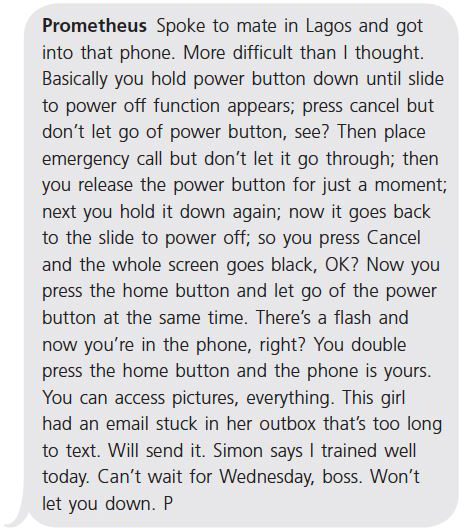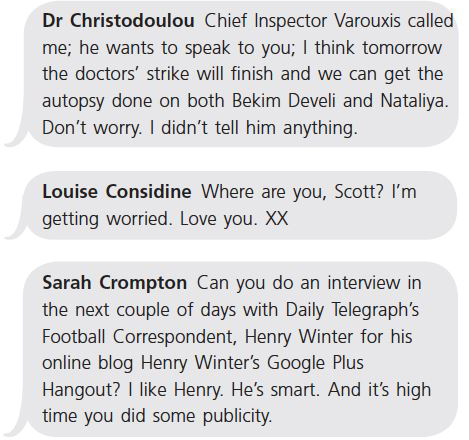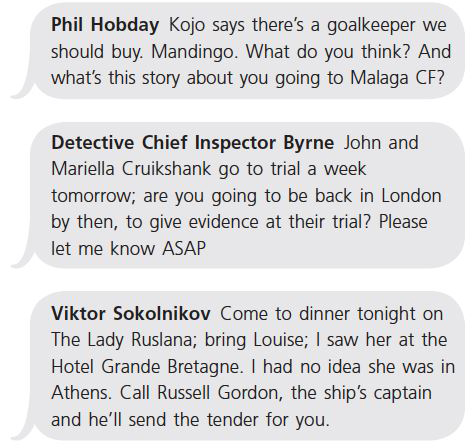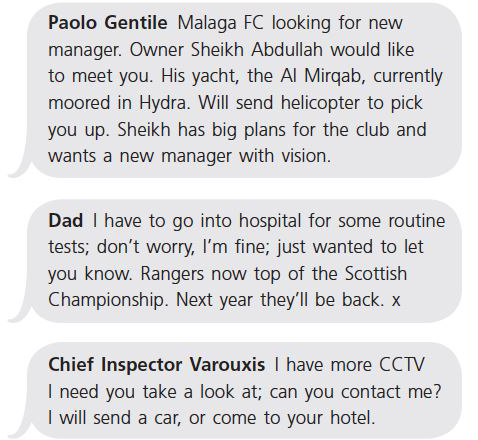Hand of God (32 page)
Authors: Philip Kerr





Downstairs, the singing in the restaurant had stopped and moved outside where it continued for a while longer. I went to the window and looked out on the square and watched the four culprits as they sat on the edge of a fountain in front of the Blue Star Ferries office, drinking beer and smoking cigarettes. One of them was wearing a T-shirt with a
Keep Calm and Carry On
slogan; another was wearing one that I’d seen almost as many times:
Lookin’ to Score BRAZIL
. They stayed there for a while and then, to everyone’s relief, left.
I picked up the iPhone and started to listen to my voicemails but these were just some of the same people and messages – more or less – as the ones who’d texted me already. There wasn’t enough bandwidth to download the document that Prometheus had attached to his email; the rest were unimportant. I called my dad to reassure myself that he really was okay; then I called Louise.
‘Hey, I’m sorry I wasn’t there when you arrived,’ I said. ‘I should have met you at the airport.’
‘That’s all right. Where are you? I was getting worried.’
‘On the island of Paros.’
‘Paros? What are you doing there?’
‘I came to Bekim Develi’s house to check out a few things. I’m glad I did because things are a lot clearer to me than they were before.’
‘So are you finished down there, Sherlock?’
‘Yes, but I’m sorry, baby, I’m not going to be able to get back to Athens until tomorrow morning. There just isn’t a flight.’
I heard some laughter in the background.
‘Where are you anyway?’ I asked.
‘On Viktor Sokolnikov’s yacht,’ she said. ‘He invited me for dinner. Wait a minute. He wants to speak to you.’
There was a longish pause and then Viktor came on the line.
‘Scott? What are you doing on Paros? You should be here with your girlfriend.’
I told him what I’d just told Louise.
‘Paros is only half an hour away from here,’ he said. ‘I’ll send the helicopter for you right now. Drive to the Hotel Astir on the north coast where I happen to know there’s a helipad we can use. I’ll have it come and pick you up. You can be here within the hour.’
‘There’s no need to go to all that trouble.’ I was keen to see Louise again but somewhat mortified that I’d forgotten that she was coming to Athens; I was also nervous about the idea of taking a night-time flight in a helicopter. ‘I can catch the plane back to Athens tomorrow.’
At the same time I knew it was wiser to return to the mainland as soon as possible. I could hardly delay telling the police what I knew for much longer. Not only that but the Wi-Fi on
The Lady Ruslana
was as quick as any on the mainland and I was keen to read the email from Nataliya’s outbox. I had a feeling it would be a key piece of evidence in identifying her murderer.
‘Nonsense,’ said Vik, ‘it’s no trouble at all.’
‘Are you sure?’
‘Of course, I’m sure. Look, you can both spend the night here on the yacht. And the tender will take you back to shore in the morning. Okay? Besides, I want to talk about this German guy, Hörst Daxenberger. And Kojo’s goalkeeper, Mandingo. And then you can tell me everything you’ve discovered since you put on your deerstalker hat and lit your favourite Meerschaum.’
We got back into Svetlana’s car and drove slowly out of the town of Naoussa, west around the bay, towards Kolymbithres and the Astir Hotel’s helipad. There was plenty of time. The hotel was less than five miles away and the only thing causing traffic on the road were the geckos.
‘I know the guy from Loukis Rent-a-Car,’ she said. ‘I’ll drive over there in the morning and tell him to come and fetch the car from my place. Zoi will lock up, of course. She’s very reliable.’
‘I’m afraid I didn’t have the guts to tell her that Bekim is dead.’
‘Don’t worry. I’ll tell her. What’s going to happen, do you think? To the house?’
‘I’ve really no idea,’ I said. ‘I’m sorry I have to leave so suddenly. I haven’t been here for very long, but I can easily see why you are. It’s a beautiful island. And look, I promise to do everything I can to keep your name from the police, Svetlana. But to do that I may need to speak to you again. So, tomorrow and for the next few days, will you make sure you go back to the Aliprantis, or somewhere that you can collect your texts and emails?’
‘Okay. I promise.’
I squeezed her hand on the gear stick.
We had driven about two miles from Naoussa when I recognised two men on the road, trying to hitch a lift. I glanced at the big Hublot on my wrist; it told me there was just enough time for a bit of payback.
‘Pull up,’ I told her. ‘I know those two guys.’
‘They’re the hooligans from the town?’
‘Two of them, anyway.’
‘Please, Scott, I don’t think this is a good idea.’
‘Actually, it’s an excellent idea,’ I said. ‘All the same, stay in the car and if they come after you, don’t wait for me, just drive away. Okay?’
Svetlana said nothing.
‘I mean it. Just drive off. Don’t think twice about it.’
I took off my watch, laid it carefully on the dashboard, buttoned my shirt to the neck and got out of the car; the road was empty and there was no one about, which suited my purpose. In the distance I could just make out the blue glow of what was likely the Hotel Astir’s floodlit swimming pool. And somewhere far away – possibly the same place – there was music: it sounded like Pharrell Williams. The two men were already running to where we were parked under a twisted olive tree thinking that they’d landed a ride home. But they stopped when they realised exactly who and what they were hurrying to.
I walked towards them in the moonlight, clapping my hands and singing a song to the tune of ‘Cwm Rhondda’; a joyous, taunting song you could hear at every football ground, on any match day in the season.
‘You’re not singing any more. You’re not singing any more.’
The one wearing the
Lookin’ to Score BRAZIL
T-shirt was about six feet tall, heavy-set, with a gold chain around his pink neck and so much golden stubble on his mug it looked like a newly harvested wheat field. The other one – the one wearing the
Keep Calm and Carry On
T-shirt was taller and thinner, his mouth as thin as a slash in a potato, his forehead curled up into a knuckle of irritation and concern. He tossed away his cigarette without a thought for the forest fires that often ravage that part of the world; he deserved a smack just for that. The best and the brightest they weren’t; but they looked tough enough.
‘We’re not looking for any trouble, mate,’ he said.
‘No?’
‘No. We’re not.’
‘You should have thought of that when you were back in the town,’ I said. ‘I didn’t like what you were singing. It’s fuckers like you that give English football a bad name. Who spoil it for decent people. But I’m not here for me. I’m here for my friend, Bekim Develi. My friend didn’t like your singing either.’
‘Listen, Manson, get back in your fucking car and drive on, you stupid black cunt.’
I grinned; any doubts I’d had about what I was going to do were now removed.
‘That’s exactly what I’m going to do.’ All this time I kept walking towards the pair. ‘Just as soon as this black cunt has sorted you out.’
The one thing I learned in the nick was how to fight like you mean it; that’s the only way you
can
fight when you’re in the nick. It’s not the kind of fighting that you see hooligans getting up to in the street, if that can even be called fighting at all. That’s the same way chimpanzees fight and most of it is just for show; they run at each other, shove a bit and shout and then stop, take a few steps back and then run at each other again, egging everyone else on, looking to see who’s really up for it, where the weaknesses are and, as a corollary, where to attack first. But in the nick you go in fast – before a screw has a chance to interfere and put a stop to it – and hard – hard enough to inflict real pain; and you don’t fucking care if you get hurt because there’s no time to think about that. Once you’re committed to it, you have to stay committed no matter what. The other thing you learn about violence in the nick is to keep your feet firmly on the ground and use your head and your elbows to aim at something small, because there’s not a lot of room in a cell or on a landing when you’re handing it out to another con. And there’s nothing smaller or more effective to aim at than another bloke’s nose.
Without a moment’s hesitation I launched a battering ram of a head-butt at the centre of the taller man’s face, and I felt something give like the sound of an egg breaking and heard him utter a loud cry of pain; it meant the fight was already half over because he collapsed onto the road and lay there holding his face. Les Ferdinand would have been proud of me; it was a great header.
One down, one to go.
Now the other man came at me and threw a big right hand which, if it had connected, would certainly have caused some damage; but he was tired, and probably drunker than I was, and the punch seemed to come all the way from Luton, on an EasyJet Airbus; delayed, of course. I had plenty of time to block it with my left forearm, which left me ample opportunity to bring a right elbow hard through my centre line against the left side of his face. Probably I didn’t have to hit him again, but I did – a hammer blow on the side of his nose that felled him like a pile of cardboard boxes, intended to render him every bit as ugly as he’d sounded in the Hotel Aliprantis. In spite of what I’d told these two guys, I hadn’t just struck a blow for Bekim: I’d also hit them for every banana ever thrown at me and for every racist epithet or obscene taunt yelled my way during a game. I kid you not, there isn’t a guy in the Barclays Premier League who wouldn’t like to hand out some grief to a bunch of fans now and again. Just ask Eric Cantona.
It was all over in less than sixty seconds; neither of them showed any intention of getting up and carrying on. I thought about kicking them both when they were on the ground and immediately rejected the idea. Knowing when to stop is as important as knowing when to start. I didn’t even say anything. I’d said all there needed to be said. I figured it would be a while before they sang anything again, least of all some crap about a man’s death.